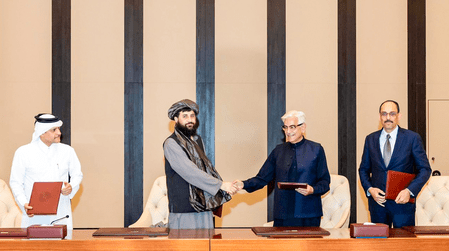Tashkent, Nov 10 — Renewed tensions between Pakistan and Afghanistan, marked by cross-border clashes, stalled peace talks, and growing security concerns, have reignited worries over the fragile stability of South and Central Asia, according to a report by Uzbekistan-based online publication Zamin.
The report stated that the escalation in 2025 reflects not only historical rivalries but also deeper structural challenges within Pakistan’s governance and security systems. “The evolving tensions between Pakistan and Afghanistan reveal the complex interplay between Pakistan’s civilian institutions and its powerful security establishment,” the report noted.
Since the late 1970s, Pakistan has played a significant role in Afghanistan’s security landscape. Initially a key ally during the Soviet-Afghan conflict, Pakistan’s involvement evolved into a long-term strategy to maintain regional influence and safeguard national interests. However, the Zamin report observed that Pakistan’s reliance on non-state actors as tools of regional policy has often proved counterproductive — fueling instability in Afghanistan and at times undermining Pakistan’s own internal security.
Analysts cited in the report argue that Pakistan’s foreign and security policy continues to be shaped heavily by its military establishment, often constraining civilian-led diplomacy and long-term policy consistency.
The recent suspension of peace talks between Islamabad and Kabul underscores these challenges, as both nations grapple with border management issues, militant activity, and refugee movements. Despite calls for cooperation, intermittent military action and hostile rhetoric have weakened diplomatic momentum.
The Zamin report further warned that persistent instability along the Afghanistan–Pakistan corridor poses risks for Central Asia, potentially disrupting major regional connectivity projects such as the Trans-Afghan Railway and CASA-1000. It stressed that countries like Uzbekistan, Tajikistan, and Turkmenistan remain vigilant, emphasizing the urgent need for cooperative regional strategies on security, counterterrorism, and economic integration.


















